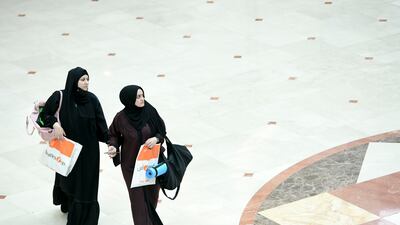Two and a half years ago, authorities in the UAE were compelled to bring in mask-wearing regulations to fight the spread of Covid-19. Albeit only temporary, these measures changed the face of life in the country, as they did in a number of others.
At points they were some of the strictest internationally, and alongside people's co-operation, quick vaccine uptake and a massive testing infrastructure, the UAE was able to emerge quickly from lockdowns and control the virus. The UAE has been cited time and again as a country with one of the most successful Covid-19 strategies, and it has maintained a low death rate in those who suffered from the coronavirus.
It might have been a quick opening up by global standards, but it was still staggered. Today, the country enters a major new phase. From September 28 people will only need to wear masks in places of worship, hospitals and on public transport. It means, for the most part, masks are no longer mandated indoors.
One group, in particular, welcoming the move is teachers. The National spoke to Rebecca Coulter, principal at Dubai British School Jumeirah Park, who said: "For our younger pupils, those in years one and two, learning in masks is all they have known. It will be wonderful for them to see the faces of their teachers and their peers and to learn without the confines of a mask.” Clare Turnbull, principal at Royal Grammar School Guildford Dubai, made an important point about young people's mental health, something that has been greatly affected by the pandemic. She believes that seeing the facial expressions of others will reduce anxiety, as well as improve learning.
Masks are not the only measure to have been revised. The home isolation period for infected people is now reduced from 10 days to five. Only those who test positive will need to quarantine, not close contacts. In Abu Dhabi, residents now only need to be tested once every 30 days to keep the Al Hosn app green, rather than every 14.
This does not mean that people should refrain from masks if they make them feel safer or if they have underlying conditions. It simply allows a greater degree of flexibility, one that reinforces the country being firmly on the track to pre-pandemic normality.
But these revised measures also reflect something deeper than an improving health situation. They show the country has come to an advanced state of living with Covid-19, factoring it into daily life safely and responsibly. This is the belief of many governments abroad, too. US President Joe Biden declared the pandemic over in a recent interview and from October 1 Canada is lifting all Covid-19 entry and travel restrictions.
Crucially, it also means that healthcare systems globally are no longer at risk of being overwhelmed, and that people are more aware of proper hygiene. The pandemic was a lesson in properly washing hands, cleaning surfaces and how to socially distance when near someone infected with a virus.
There is one final change UAE authorities announced that is perhaps the most symbolic of all. The number of daily Covid-19 cases will no longer be published. That does not mean the virus is out of the country. It means that the severe risks it posed in the beginning are. That is something about which everyone in the UAE can feel proud.








